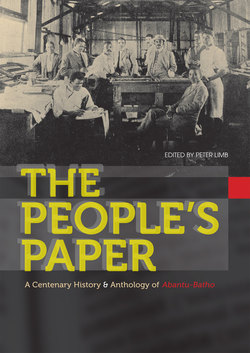Читать книгу The People’s Paper - Christopher Lowe - Страница 16
На сайте Литреса книга снята с продажи.
OUTLINE OF THE BOOK
ОглавлениеIn a pair of twinned opening chapters, Peter Limb provides a broad overview of Abantu-Batho. He reveals the main thematic content over its lifespan, first surveying politics, racism, solidarity, war and labour, and then moving on to discuss gender, education, religion, and, finally, love and leisure. If politics and race were central to Abantu-Batho, then it also recorded the social and cultural lives and religious, educational, literary and leisure pursuits of Africans. Editors and correspondents served these up in a wide variety of forms and ideologies. Binding them together was a fierce journalistic independence and assertiveness of African identities and solidarities.
The next section, ‘Founders and Editors’, comprises three chapters on some of the most significant people behind Abantu-Batho. The role and motivations of Pixley Seme in founding and initially managing the paper is analysed by Chris Saunders. Sarah Mkhonza provides a much-needed gendering of African newspaper history in rewriting Queen Labotsibeni’s life to bring out her significant role in the formation of and providing continuing support for Abantu-Batho. Closely related in its focus on the Swazi association, Grant Christison explains the involvement of the editor-poet Robert Grendon.
The section entitled ‘Themes and Connections’ brings together six chapters that plumb the rich and complex content of Abantu-Batho. Chris Lowe addresses the Swazi royal connection and pan-ethnic nationalism. Changing disciplinary tack, Jeff Opland reveals how the major Xhosa poets Nontsizi Mgqwetho and Mqhayi published in Abantu-Batho and analyses their poetic and political context. Focusing on Johannesburg, Paul Landau unpacks the ‘Shilling Strike’ of 1918 to reveal the complexities of language and translation in the reporting of Abantu-Batho and its interlocutors and police spies. In doing so, he presents a refreshing new take on the multiple language discourses going on in its columns and in crowded public meetings attended by its editors. Sifiso Ndlovu and Peter Limb examine the discourse around African royalty in the pages of Abantu-Batho, with particular emphasis on Thema’s views of King Dingane. Robert Vinson explores Abantu-Batho and Garveyism in South Africa and the African diaspora. Finally, Limb addresses the journalism and associational context, and then concludes by assessing the complex legacy of Abantu-Batho. The paper went under in 1931, but it left a memory of investigative journalism and combative politics that persisted in the consciousness of both masses and elites, and it also left behind experienced journalists who went on to other newspapers and readers who hungered for a similarly committed voice.
Part II provides access to the press itself, with a never-before published anthology of editorials, articles and letters carried from every year of its existence, hence as representative as one could be. In this select compilation of the hard-to-obtain Abantu-Batho, a host of neglected political and intellectual figures spring to life. We see not only how in the ANC’s first two decades Abantu-Batho asked complex political questions, but also how it provided a forum for people to air and debate their deep concerns about ever-present racial discrimination, and gender and labour inequalities. In its columns, writers articulated emerging discourses of African nationalist and Pan-African solidarities, as well as the assertion of the dignity of African people and their history.
